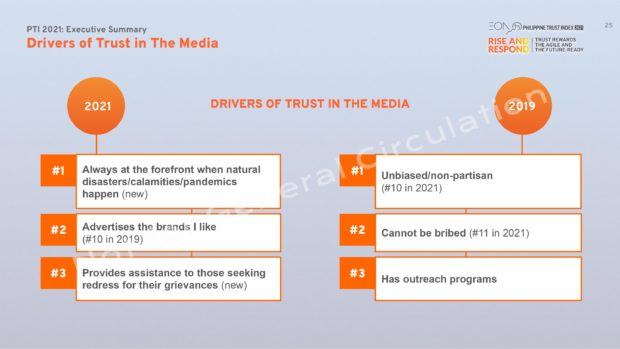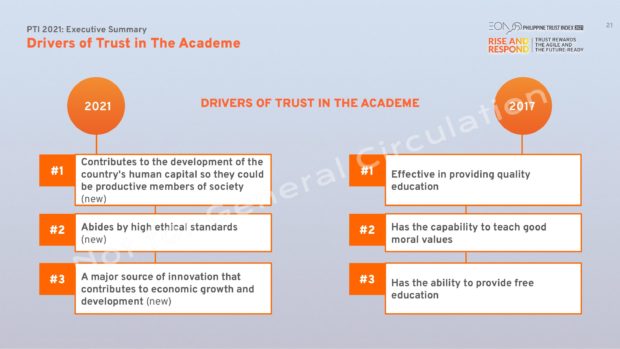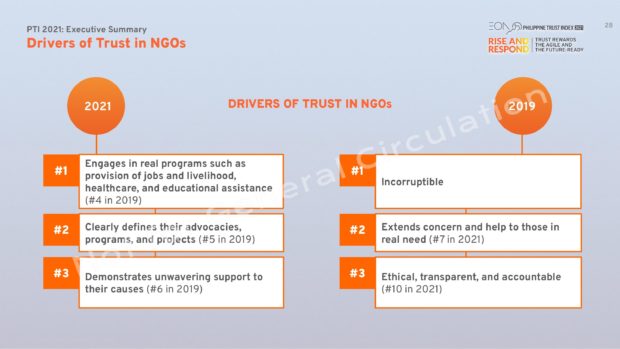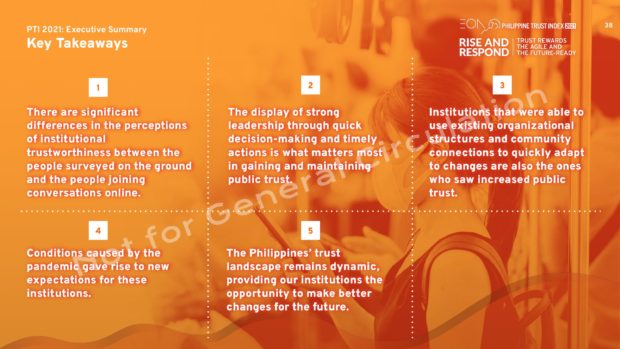Filipinos’ trust in business sector dips, unchanged in 5 other institutions
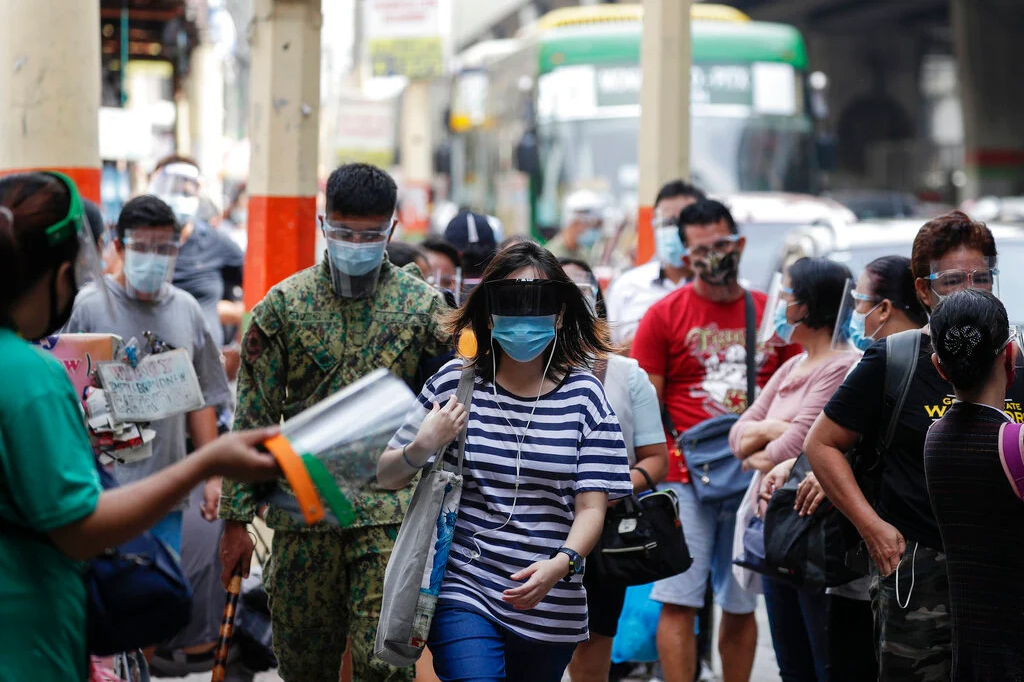
FILE PHOTO: People wear face masks and face shields to help curb the spread of COVID-19 as they walk along the streets in Quezon City, Philippines on Wednesday, Aug. 19, 2020. Philippine President Rodrigo Duterte has decided to ease a mild coronavirus lockdown in the capital and four outlying provinces to further reopen the country’s battered economy despite having the most reported infections in Southeast Asia. (AP Photo/Aaron Favila)
MANILA, Philippines—The ongoing pandemic caused by COVID-19 has made an impact on Filipinos’ level of trust in six key institutions in the country—government, business sector, media, non-government organizations (NGOs), the Church, and the academe.
According to the 2021 Philippine Trust Index (PTI) released by communications consultancy EON Group for 2021, trust level for the business sector declined while NGOs had the highest trust gain among all sectors—“nearly doubling its 2019 trust rating this year,” the firm said.
The other sectors were able to maintain their public trust level from 2019.
The PTI, according to EON Group, is a nationwide research effort that “cuts across socio-economic, educational, geographic, and demographic backgrounds to discover just how much Filipinos trust the six key institutions in society.”
For the seventh PTI, at least 800 respondents nationwide were surveyed from August to September 2021. The firm also monitored “online conversations” between August 2020 to August 2021 “to get a picture of the country’s landscape from the perspective of both the people on the ground and those who join discussions online.”
Closer look
Numbers showing on-ground trust in institutions showed that since 2017, the Filipinos’ level of trust in the business sector has been going down.
In 2017, it gained a total trust of 75 percent—60 percent of survey respondents that year said they have moderate trust for the sector while 15 percent expressed extreme trust. The total trust rating slid down to 71 percent in 2019, with 56 percent saying they have moderate trust and still 15 percent with extreme trust in the business sector.
This year, the sector gained a total of 66 percent trust on-ground rating —fewer respondents showed moderate trust in the sector at 48 percent while the percentage of Filipinos who had extreme trust in the sector slightly increased to 18 percent.
“During a time of crisis, such as the past two years of living with the pandemic, business turned out to be the biggest loser when it comes to the public’s perception of trustworthiness, while the other five institutions have been able to gain or maintain the public’s trust,” said Richard Arboleda, president and CEO of The EON Group.
The top five most trusted business sectors in 2021 were:
- Food and Beverage: 91% (2021), 82% (2019)
- Health Care Services: 91% (2021), 83% (2019)
- Pharmaceuticals: 90% (2021), 79% (2019)
- Telecommunication: 88% (2021), 77% (2019%)
- Water and Sanitation: 86% (2021), 69% (2019%)
Meanwhile, the least trusted were:
- Real Estate and Construction: 71% (2021), 69% (2019)
- Advertising and PR: 71% (2021), 58% (2019)
- Alcohol and Tobacco: 70% (2021), 43% (2019)
- Insurance: 68% (2021), 56 (2019)
- Mining: 52% (2021), 32% (2019)
“Trust in different business sectors in 2021 are similar to 2019’s, with the same two industries occupying the most trusted spots,” The EON Group’s Head of Business Development Moby Aragones said.
“Although the sectors whose products and services have been necessary during the pandemic received the biggest increase in trust, most industries have seen improved ratings,” he added.
NGOs, on the other hand, improved their public trust perception during the pandemic.
The institution had a 59 percent total trust from survey respondents in 2017, with 46 percent moderate trust rating and 13 percent extreme trust rating. The figures in 2019, however, sank to 37 percent in overall trust rating, 29 percent for moderate trust rating, and eight percent for the extreme trust rating.
This year, as Filipinos continue to be burdened by the impact of the COVID-19 pandemic, NGOs as an institution saw a zoom in public trust ratings with 70 percent total trust from survey respondents—53 percent said they have moderate trust in the institution while 17 percent expressed extreme trust.
Meanwhile, unlike the other two institutions which had highs and lows, findings from the PTI 2021 saw that the public’s perception of trustworthiness towards the government remained constant since 2019.
Four years ago, in 2017, the public’s total trust rating for the government was 80 percent—with 51 percent moderate trust rating and 29 percent extreme trust rating.
Two years later, in 2019, total trust went slightly down to 76 percent, while the moderate trust and extreme trust ratings went up to 47 percent and 29 percent. This year, the total trust rating was still 76 percent, with a 56 percent moderate trust rating and 20 percent extreme trust rating from the public.
Trust on-ground for the three other institutions—Church, academe, and the media—based on data provided in PTI 2021 are as follows:
- Church
2017 – 93% (Total trust), 27% (moderate trust), 66% (extreme trust)
2019 – 90% (Total trust), 24% (moderate trust), 66% (extreme trust)
2021 – 91% (Total trust), 37% (moderate trust), 54% (extreme trust)
- Academe
2017 – 93% (Total trust), 36% (moderate trust), 57% (extreme trust)
2019 – 90% (Total trust), 38% (moderate trust), 52% (extreme trust)
2021 – 90% (Total trust), 43% (moderate trust), 47% (extreme trust) - Media
2017 – 78% (Total trust), 50% (moderate trust), 28% (extreme trust)
2019 – 69% (Total trust), 47% (moderate trust), 22% (extreme trust)
2021 – 76% (Total trust), 56% (moderate trust), 20% (extreme trust)
Online trust perception
The EON Group, in the PTI 2021, noted the “significant differences in the perceptions of institutional trustworthiness” between those who were surveyed on the ground and those who participated in conversations online.
“[S]entiments of trust expressed in the digital space over the past two years have lowered across almost all institutions,” said Teddy Mapa, head of Strategic Planning & Analytics of The EON Group.
“In terms of distrust, the government still holds mostly unfavorable views from social media users, with negative mentions comprising a majority of online conversations about it,” Mapa added.
The percentage of online trust in institutions, for 2019 and 2021, are as follows:
- Government: 17% trust, 25% neutral, 58% distrust (2019); 20% trust, 36% neutral, 44% distrust (2021)
- Media: 11% trust, 27% neutral, 62% distrust (2019); 10% trust, 64% neutral, 26% distrust (2021)
- Business: 85% trust, 6% neutral, 9% distrust (2019); 18% trust, 76% neutral, 6% distrust (2021)
- NGO: 52% trust, 1% neutral, 47% distrust (2019); 45% trust, 50% neutral, 5% distrust (2021)
- Chruch: 86% trust, 4% neutral, 10% distrust (2019); 98% neutral, 2% distrust (2021)
- Academe: 36% trust, 42% neutral, 22% distrust (2019); 10% trust, 90% neutral (2021)
Pandemic and public trust
According to the firm, the COVID-19 pandemic “gave rise to new expectations for [the six key] institutions.”
The church, academe, and media have new drivers of trust this year, compared to those in 2017.
According to PTI 2021, the new drivers of trust in the Church were:
- The Church has integrity and promoted honesty. Respondents also believed that the institution provided a full accounting of its funds and other resources it has received from its flock.
- The institution has a wide reach and a global connection.
- The Church has distanced itself from the affairs of the state or has left politics to politicians.
The new drivers of trust in the academe were:
- The institution “contributes to the development of the country’s human capital so they could be productive.”
- The academe, according to survey respondents, abides by high ethical standards.
- It is also a “major source of innovation which contributes to economic growth and development.”
The new drivers of trust in media included:
- The media’s ability to be always at the forefront during natural disasters, calamities, or pandemics.
- The institution was also able to provide assistance to those seeking redress for their grievances.
The drivers of trust in the business, government, and NGO sectors for 2021 were not new, however, although the drivers were relevant amid the COVID-19 pandemic.
Among the drivers of trust in NGOs were:
- It engages in real programs including the provision of jobs and livelihood, healthcare, and educational assistance. (#4 in 2019)
- The institution clearly defines its advocacies, programs, and projects. (#5 in 2019)
- The NGOs demonstrate unwavering support for their causes. (#6 in 2019)
Drivers of trust in the government include:
- It helps address the basic needs of the poor such as housing, food, and education. (#2 in 2019)
- It improved the country’s economy. (#4 in 2019)
- It protects Philippine territories. (#9 in 2019)
“The top concern of national peace and security in 2019 is no longer the main priority in 2021, with the public’s survival and safety concerns during the pandemic pushing other, more urgent expectations of the government to the forefront,” Fully Fullon, The EON Group’s head of design, explained.
The drivers of trust in business this year were:
- Businesses have fair labor practices. (#2 in 2019)
- It provides good pay and benefits to its employees. (#1 in 2019)
- The sector implements environment-friendly policies and programs. (#7 in 2019)
“The institution’s top two trust drivers in 2019 remained as the public’s top expectations this year,” said September Mahino, Editor-in-Chief of the EON Trust Central.
“However, drivers of trust in 2021 do not reflect or require any special display of leadership and agility to mitigate the effects of the pandemic on Filipino’s lives,” she added.
The EON Group also said strong leadership through quick decision-making and timely actions mattered the most in gaining and maintaining public trust, especially amid the pandemic.
The institutions that were able to “use existing organizational structures and community connections” to adapt quickly to challenges and changes brought by the pandemic have seen an increase in public trust, the firm said.
Many chose to stay
Despite the public’s decline in trust in the six key institutions in the country, the majority of the survey respondents said they will stay in the country, even after travel restrictions are lifted.
“In spite of the challenging circumstances of the pandemic, when asked if they are considering leaving the country…a resounding majority of those who took the survey on the ground, 91%, said NO,” the EON Group said.
Meanwhile, those who answered yes explained they will fly out of the country to seek better job opportunities abroad.
According to a COVID impact assessment report recently released by the International Organization for Migration (IOM) Philippines, of the 8,332 OFW returnees surveyed, almost half, or 48 percent, said they plan to re-migrate abroad.
IOM detailed that out of those who aim to work overseas again, the prevalence was higher among males and sea-based workers, with 53 percent and 63 percent.
Female returnees and land-based workers, on the other hand, were more likely to consider internal migration than males, but are likely to stay at home.
READ: National action plan emerging vs illegal recruitment
TSB
For more news about the novel coronavirus click here.
What you need to know about Coronavirus.
For more information on COVID-19, call the DOH Hotline: (02) 86517800 local 1149/1150.
The Inquirer Foundation supports our healthcare frontliners and is still accepting cash donations to be deposited at Banco de Oro (BDO) current account #007960018860 or donate through PayMaya using this link.
